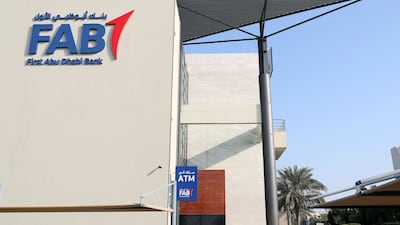First Abu Dhabi Bank, the UAE’s largest lender by assets, said its 2022 net profit rose 7 per cent to a record on higher interest income and strong performance of its core business as the country's economy expanded at the fastest pace in over a decade.
Net profit attributable to shareholders for the 12-month period to the end of December, surged to Dh13.4 billion ($3.65 billion) from a year earlier, the lender said in a statement on Thursday to the Abu Dhabi Securities Exchange, where its shares are traded.
Operating profit for the period climbed 9 per cent year-on-year to Dh17 billion, while net interest income jumped 23 per cent to Dh14.4 billion.
"2022 was a year of continued strategic diversification and expansion for the UAE and regional economies, which posted their fastest economic growth in a decade. By capitalising on the favourable macroeconomic conditions, FAB has been laying foundations for the future," FAB chairman Sheikh Tahnoon Al Nahyan said.
“In achieving the group’s highest annual revenue and net profit to-date, FAB has strengthened its strategic position to build a future-proof bank.”
The UAE economy is projected to have grown by 7.6 per cent in 2022, driven by a sharp expansion in both oil and non-oil sectors, according to the estimates by the UAE Central Bank.
The economy bounced back strongly in 2021 from the pandemic-driven slowdown and continued growth momentum last year, driven by higher oil prices and lower inflation.
In December, UAE Minister of Economy Abdulla bin Touq said the country’s gross domestic product is expected to have grown by 6.5 per cent.
The net profit of lenders in the six-member economic bloc of GCC will recover this year almost to pre-pandemic levels in 2022, according to S&P Global Ratings.
Stronger economic growth and support measures mean that the cost of risk will return to 100 basis points for the top 45 banks, the ratings agency said. Banks will continue to benefit from the declining cost of staff and smaller branch networks.
FAB's total income grew 10 per cent during the reporting period to almost Dh24 billion.
It included a Dh3.1 billion gain on the sale of the bank's stake in Magnati. FAB sold its shareholding in payments business to New York-listed Brookfield Business Partners in the first quarter of last year.
Net income for the three month period to the end of December, however, dropped to about Dh 2.5 billion, down from Dh3.3 billion for the same period in 2021.
FAB said the slide in quarterly income reflects "prudent provisioning and conservative asset valuations".
Impairment charges for the loan losses for the 12-month period rose by 7 per cent annually to Dh2.8 billion. It includes a Dh1.1 billion charge taken in the fourth quarter.
Operating cost climbed 15 per cent year-on-year to Dh6.7 billion, driven by integration of operations in Egypt. Write-off of legacy systems in fourth quarter as part of our continuing technology transformation strategy, as well as continued investments into the business, also drove costs higher.
"We continued to consolidate and build our presence in priority markets, including in Egypt through FABMisr," Hana Al Rostamani, group chief executive of FAB, said.

"Underlying operating performance across our core businesses was sustained during the fourth quarter despite a more challenging global macroeconomic outlook. This has provided us headroom to further build provision buffers, take a conservative stance on asset valuations and to continue to invest in our technology platform."
FAB remains confident in the "resilience of this region" and it is well placed to "capitalise on the opportunities to drive superior and sustainable shareholder returns in 2023 and beyond", she added.
FAB's total assets grew 11 per cent year-on-year to more than Dh1.1 trillion. Loans and advances rose 12 per cent to Dh460 billion, while customer deposits surged by 14 per cent annually to Dh701 billion.
FAB, which estimates UAE's economy to have grown 6.7 per cent in 2022, expects gross domestic product to expand in 2023, albeit at a more modest rate of 5 per cent, given the global economic deceleration.
"Going into 2023, we anticipate a relatively benign inflation outlook compared to many parts of the world, which should provide welcome stability against the macroeconomic backdrop," the bank said.
Although the broader Gulf will "not be immune to global price pressures and economic slowdown", FAB expects the UAE's economic growth to be "more sustainable as economic diversification continues to evolve".
Separately on Thursday, FAB said it has appointed Lars Kramer as group chief financial officer following the decision of James Burdett, to retire and return home to New Zealand.


